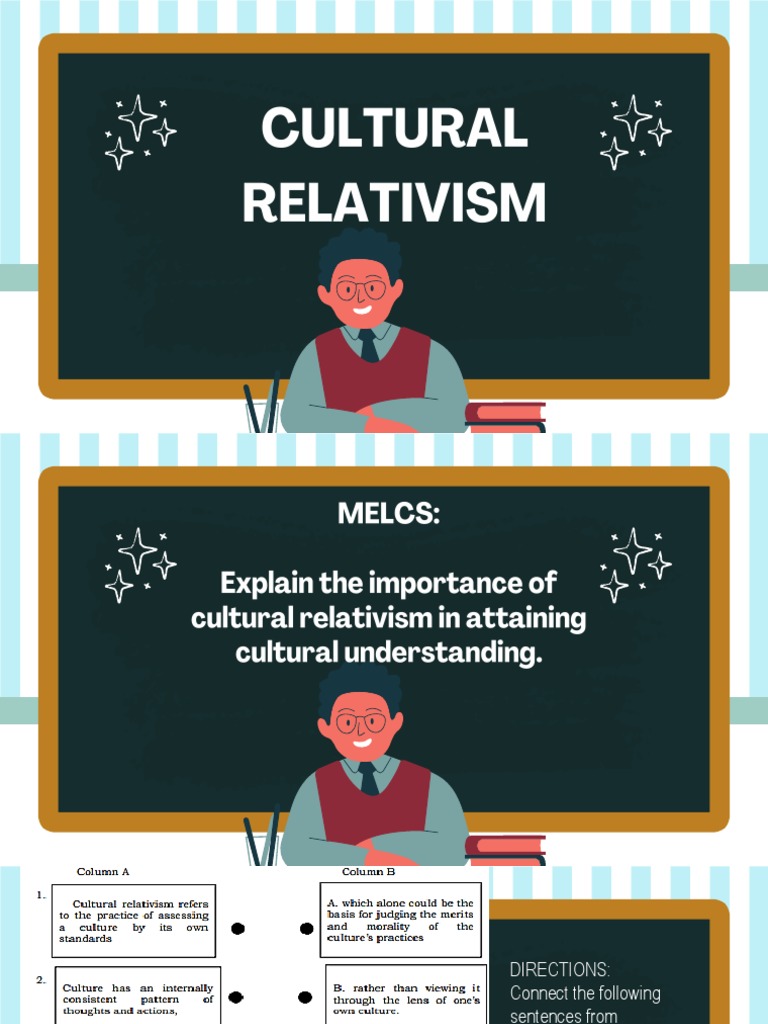Cultural relativism is a significant principle in human geography that posits the understanding of cultural practices and beliefs within their own contextual realities rather than through the lens of another culture. This concept can be especially beneficial in comprehending the intricate web of human interactions on a global scale, wherein geographical, social, and political factors intermingle. It prompts us to ask: how can understanding diverse cultural contexts enhance our approach to global issues, such as climate change?
The foundations of cultural relativism rest upon the idea that all cultures possess intrinsic value and merit respect. This perspective nurtures a broader comprehension of the diverse socio-environmental frameworks that exist around the world. By situating cultural practices within their geographic and historical contexts, human geographers can analyze the ways in which human behavior and environmental adaptations manifest differently across various regions.
At its core, cultural relativism challenges ethnocentric views that often dominate global narratives. Ethnocentrism, the inclination to evaluate other cultures based on the standards of one’s own, can lead to misguided policies and interventions. For instance, when addressing climate change, a predominantly Western-centric view may overlook the sustainable practices inherent in indigenous cultures. These practices, deeply rooted in their specific environments and traditions, can provide valuable insights that might be ignored in a more homogenized approach.
Take, for example, the diverse responses to climate change across different cultures. Some indigenous populations have developed intricate systems of knowledge that are perfectly tailored to their local environments. Their practices often emphasize sustainability and harmony with nature, quite contrary to more industrialized societies, where consumerism and rapid development have led to significant environmental degradation. The challenge lies in adequately appreciating and integrating these various cultural insights into global climate strategies.
Cultural relativism serves as a reminder that there is no universal solution to the multifaceted challenges posed by climate change. The imposition of a one-size-fits-all strategy can lead to the erosion of local customs and knowledge systems. Consequently, this can hamper local communities’ ability to cope with environmental changes. Therefore, an understanding of cultural relativism might allow for more nuanced and equitable approaches to addressing climate consequences.
In human geography, the geographical distribution of cultures offers a fascinating overview of how different societies adapt their practices to their environmental surroundings. The concept of biogeography—the study of the distribution of species—illustrates how ecosystems and cultures are intricately linked. For instance, coastal communities across the world have developed unique cultural identities that reflect their dependence on marine environments. These identities beget specific ecological knowledge, resilience strategies, and cultural norms surrounding resource use. Such insights can guide contemporary environmental management practices.
Moreover, the concept of cultural landscape exemplifies the manifestation of cultural relativism in human geography. A cultural landscape is a geographic area that has been shaped by human culture. These landscapes carry historical significance and reveal the interaction between culture and the environment. Examining cultural landscapes allows for a deeper understanding of how local cultures engage with their environments. This understanding is crucial when devising solutions to mitigate climate change, as it emphasizes localized practices and knowledge.
However, cultural relativism is not without its criticisms. Some argue that it risks promoting a form of moral relativism, raising concerns about potentially harmful practices that could be justified in the name of cultural tradition. This presents a challenge when advocating for environmental cooperation that may necessitate changes in traditional practices viewed as unsustainable. Therefore, it is vital to find a balance between respecting cultural diversity and endorsing universally beneficial environmental standards.
This tension raises critical questions about the roles of governance, social equity, and cultural preservation in the quest for environmental justice. How can modern societies navigate these complexities while ensuring that the voices of marginalized communities are heard? Is it possible to develop responsive policies that respect cultural uniqueness while simultaneously striving for global environmental goals? These questions provoke meaningful discourse about collaboration across cultures.
As climate change unfolds, the interconnectedness of cultures becomes increasingly evident. The challenges presented by environmental degradation do not recognize cultural boundaries; they require a participatory approach that integrates diverse knowledge systems. Such collaboration should prioritize mutual respect and understanding. Human geographers, through cultural relativism, can foster dialogues that transcend simplistic narratives and empower communities to devise strategies rooted in their cultural contexts.
Exploring cultural relativism in human geography thus sheds light on the importance of integrating diverse cultural narratives into environmental discourse. By valuing the specificity of local practices, societies can craft comprehensive responses to climate change that embrace rather than diminish cultural diversity. The playful question of how cultural understanding can enhance our response to global challenges serves as both an invitation and a profound challenge. In our collective endeavor to protect the planet, perhaps the most potent tool lies in our ability to learn from one another while respecting the distinct cultural tapestries woven across the world.
